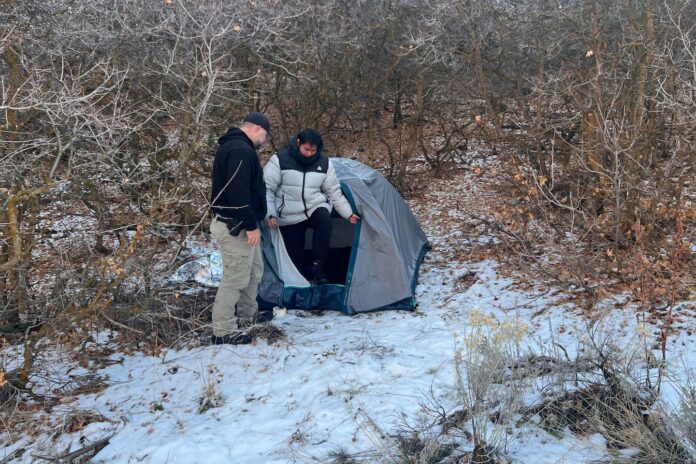Kai Zhuang, who was living in Riverdale, was discovered “alive but very cold and scared” inside a tent in remote mountains near Brigham City, Riverdale Police Chief Casey Warren said in a statement Sunday, noting that the teen was probably instructed by those conducting the scam to isolate himself.
Exchange students, particularly from China, are often targeted in virtual kidnapping cases, Warren said, adding that victims “often comply out of fear that their families will be harmed if they do not comply with the cyber kidnappers.”
According to the FBI, while the crime can take on myriad forms, it is “always an extortion scheme” in which families are tricked to believe a loved one has been abducted and are coerced into paying a fee, though the person claimed to be missing has not actually been taken. Families are often sent voice recordings and photos by the perpetrators in a bid to convince them that the crime is taking place, the Riverdale police statement said. The Washington Post was unable to reach the Chinese Embassy in Washington for a request for comment.
Warren said Kai’s high school contacted police on Thursday and reported him missing, saying his family in China received photographic evidence appearing to show that he was being held captive. Kai’s host family in Riverdale was unaware that he was missing, police said, adding that there was no evidence to suggest the teen had been “forcefully taken.”
Police said that the teen was being “manipulated and controlled” by the perpetrators in the days before he was found and that they believed the victim “was isolating himself at the direction of the cyber kidnappers.”
Kai’s relatives in China said they received “continuous threats” — and as a result transferred approximately $80,000 as a ransom fee to bank accounts in the country, according to the police statement.
Riverdale police said they worked with the FBI, the U.S. Embassy in Beijing and Chinese officials to locate the student and were concerned that he would “freeze to death” amid extremely low temperatures, which can be as low as minus-9 degrees Fahrenheit this time of year. Officers used drones to search the woodland and hiked to reach the secluded area where Kai was eventually found camping alone on the weekend, police said.
Kai “had no heat source inside the tent, only a heat blanket, a sleeping bag, limited food and water and several phones that were presumed to be used to carry out the cyber kidnapping,” Warren said.
In recent years, FBI officials have issued guidance that they hope will prevent people from falling victim to scams like the one that played out in Utah over the weekend. The crime was once limited to Mexico and Southwestern border states but now impacts residents across the United States, the FBI said.
The tactic “is always an extortion scheme that tricks victims into paying a ransom to free a loved one they believe is being threatened with violence or death,” the FBI said. Victims forced into isolation are usually monitored by perpetrators using Skype or FaceTime calls, Riverdale police said.
Families of those they believe to be kidnapped are usually asked to transfer ransom payments online — though cash drops have been made in some cases, police said.
According to FBI guidance, people should be wary of calls that do not come from the alleged victim’s phone number and should not engage. “Do not send money,” Riverdale police added in their statement.
Kai was “relieved” to be rescued, Warren said. The police department shared footage on Facebook showing officers approaching the tent in the desolate spot, propped up on a ground blanketed by snow. The teen is seen in the video holding his head in his hands as officers at the scene attempt to comfort him.
Kai was checked over by medical professionals and cleared of any concerns, and had just two requests for the investigators who found him: to speak to his family and to eat a warm cheeseburger — “both of which were accomplished,” police said.



